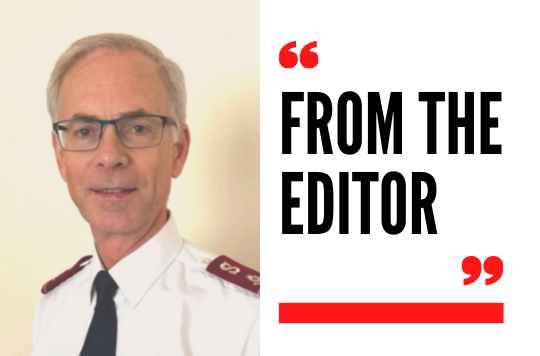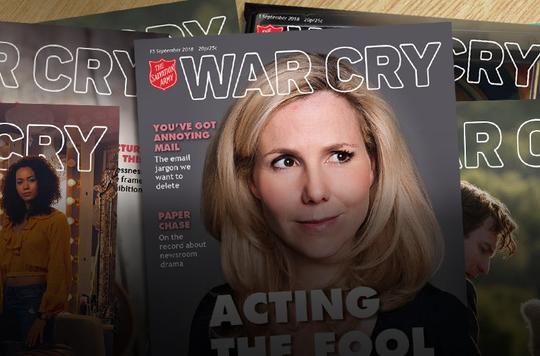Article of the week: ‘Being autistic is part of who I am’
27 March 2021
INTERVIEW
To mark World Autism Awareness Week, Peter Hobson talks to Sarah Olowofoyeku about being autistic and wanting to ensure others like him are accepted
BEFORE leaving school, Peter Hobson was told that he would never get into university, would never have a full-time job and would never live independently. The reason? Peter is autistic.
A little over a decade later, he has graduated from university, has a full-time job and lives independently. He is one of the 16 per cent of autistic adults who
are in full-time employment, a figure that has remained static since 2007. It is a statistic that Peter wants to see change.
Ahead of World Autism Awareness Week, which begins on 29 March, I spoke to Peter about his experiences.
‘Growing up, I spent most of my school life out of the classroom,’ he recalls. ‘I was bullied because of the differences in how I interpreted people and understood things that were happening.
‘At home, I didn’t want to be around people for long periods of time, so I spent a lot of time in my room. I wanted things organised, so if things got moved around in a room I became very agitated and distressed. I also didn’t want anyone to hug me.
‘My mum and dad loved me, but it was not an easy road. My mum fought for me so much throughout my childhood and beyond, and I’ll never forget that. My family is such an important part of my life.’
Despite poor grades at school Peter achieved things he never thought he would. It wasn’t until 2018, at the age of 29, that he was officially diagnosed with autism.
‘Autism is a neurological condition that impacts the way someone interacts with the world around them,’ he explains. ‘It’s wide-ranging so everybody is different. Usually someone who is autistic like me may have difficulties communicating, may need routine and structure and may have certain special interests.’
When he received his diagnosis, ‘life started feeling normal’, he says.
‘Everything started making sense. It was a special moment for me, when I realised that I wasn’t this strange person.’
Motivated by his experiences, Peter works as part of the equality and diversity team at THQ. He is keen to emphasise that there is no one-size-fits-all approach to learning about autism and supporting those who are autistic.
‘Everybody is an individual, so what works for me might not work for other people. One of the most critical things is not to pre-empt what the support might look like for someone. It’s important to have a conversation with the autistic person directly to find out how you can support them or what changes you could make.
‘My line manager and I have an excellent working relationship because I can be open with her about things I find difficult. I’m not good with uncertainty, and she knows to advise me of changes well in advance so I can prepare myself for them.’
‘More than being aware of autism,’ he adds, ‘it’s about trying to understand and accept the person. It boils down to being compassionate and understanding.’
Peter hopes that greater understanding will improve the number of autistic people in full-time employment.
‘A lot of autistic people want to work, and there is a lot that they can give to organisations. Companies are missing out on talent by not giving more autistic people an opportunity in society as a whole.’
He encourages people to see an autistic person’s diagnosis positively.
‘We must look at the person’s abilities, rather than seeing what the person finds difficult and that being the most important thing. If you’ve ever seen a diagnosis, the paperwork says “Peter can’t do this, Peter can’t do that, Peter may struggle with this”. And while some of those things are true, the diagnosis never says anything like “Peter can do this”.
‘I had to try to see the positives of my diagnosis. By going to university, living independently and working full-time, I made the impossible possible. Being autistic is part of who I am. It’s not going away, but I have a lot to offer.’
Peter’s work is driven not only by his experiences but also by his beliefs, and faith has helped him personally.
‘Though I don’t always feel it, like sometimes when I’m upset, there are times when I am able to feel that unconditional love from God. There are times in my life when I’ve struggled, and without my relationship with God I don’t think I would’ve got through half of them. Sometimes the help I need comes from the most unexpected place. I’m not always sure where it has come from, but I know it’s there.’
- Read the full interview in this week’s War Cry at salvationarmy.org.uk/publications/war-cry
SARAH IS ASSISTANT EDITOR OF WAR CRY

From the editor
An early look at the editor's comment

Salvationist
Salvationist is a weekly magazine for members and friends of The Salvation Army

The War Cry
The War Cry is packed with features, reviews, mouth-watering recipes, puzzles and more.